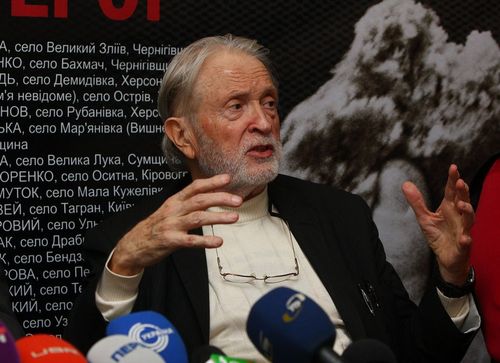Commemorating the tragedy’s 80th anniversary
Kyiv hosted the world premiere of the opera Red Earth. Hunger
When the curtain went up, the audience saw the Kyivska Kamerata’s musicians on the National Opera’s stage, lit red and led by the conductor, laureate of the Shevchenko Prize and winner of the Grammy Awards, the opera’s composer Virko Baley from the US. Soloists appeared to the right with a sagging black cross in the background. Five of them came from the US as well, including soprano Marie Plette (Woman), tenor John Duykers (Man), baritone Tod Fitzpatrick (Woman’s Father), and countertenor Eric Brenner (Poet and Voice from the Cross). The show featured six Ukrainian soloists, too: mezzo-soprano Tetiana Zolotarevska (Old Woman), soprano Larysa Zavialova (First Woman), soprano Anna Dvorytska (Second Woman), soprano Olha Romanenko (Third Woman), mezzo-soprano Oksana Loboiko (Fourth Woman), mezzo-soprano Olena Tsyhankova (Fifth Woman), and the Kyiv Chamber Choir led by Mykola Hobdych. The opera was performed in English with Ukrainian subtitles.
Tadei Ryndzak, a prominent artist, painted the Holodomor victims carrying their crosses and going into eternity in the backdrop of the stage. The dusky greenish gray color and rhythm of the many faceless draped figures created a tragic image. The story had Woman putting baby to her dry breast, while the scenery depicted a child flying to the Earth from the outer space to find shelter...
Librettist Bohdan Boichuk tried to capture different facets of human life through surrealist and expressionist imagery. Lacking ballet, the opera’s concert version was a generalized implementation of the show’s director Vasyl Vovkun’s concept.
The story’s dramaturgy is based on Ukrainian reality of the Holodomor years 1932-33 and dialogues between symbolic figures of Woman with a Baby and Angry Man, combining to create a Beckettian atmosphere with some expressionist features. While Woman is the embodiment of moral values, Man is at first strikingly cynical, lacking faith in any human virtue, but the character grows more multifaceted over the story’s duration, and in the end, he tries to sacrifice his own life to save the child.
Red Earth. Hunger’s score is rich in percussion music, while poignant solos of wooden instruments tell the martyrs’ monologues. To highlight the dead father’s otherworldly intonation, the composer has interrupted his breathing, implemented via the singer striking his chest with his fist. “Little Board,” a folk song, appears as the only island of humanity in the terrible world of hopelessness and brutality. And then, darkness consumes the souls of the opera’s peasant characters again, as they sing “Trisagion,” it seems, from underground...
The great impression from the opera is likely to be gradually realized by the audience. Its creators and performers have coped with an extremely challenging task of translating anti-artistic and inhumane historical truth through artistic means.
Newspaper output №:
№75, (2013)Section
Day After Day





